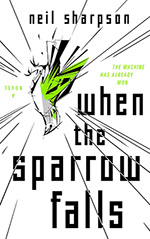
![]() Naomi_uk72
Naomi_uk72
6/26/2021
![]()
DISCLAIMER: I received an advanced reading copy of this novel from the publishers in return for an honest and unbiased review. My thanks to Rebellion Publishing for the opportunity.
In the Twenty-Third Century, over half of the human race has evolved beyond the need for a physical body, their conscious minds transferred into an endless virtual nirvana. AI all but run the world, and for the most part hunger, poverty, and social inequality have been all but eradicated. But in the Caspian Republic, home of the New Humanist movement, the last true humans make their stand in a repressive one party state, fighting a cold war against the machine world that they have no hope of winning.
This novel is effectively two stories in one. On the surface it's a fairly straightforward neo-noir thriller with a cyberpunk twist, in which the protagonist, State Security Agent Nikolai South is tasked with escorting and protecting the widow of a dead journalist through a city that would rip her apart if they found out who, or more accurately what, she really was. As the story unfolds, and more of the details and secrets of the journalist's life are uncovered, South is forced to question his loyalty to the state, and even the so-called truth he's been fed by the party that controls his every waking moment. Intertwined with this primary narrative is the history of the Caspian Republic, and the true story behind the nation's formation and continued existence, which in itself is an intriguing look at the path to totalitarianism.
This is an absolutely fantastic piece of writing. Developed by the author from his own successful stage play, it carries more than a hint of Philip K. Dick in its DNA, with a twist of Orwell's 1984 thrown in for good measure. The words flow easily off the page, and the plot clips along at a cracking pace, never once being held up by the intermittent world building and exposition of the side story. Indeed, the bulk of that second narrative thread is presented as contextual quotes and in-world extracts at the head of each chapter. It's an approach that Sharpson uses to great effect, keeping the reader suitably informed of the background specifics required for the next part of the main narrative. And that background is so rich in detail that it doesn't take long for the reader to feel like they themselves are a part of the dark, oppressive world that's been laid before them.
Overall, this is definitely a book that I'd recommend to fans of noirish sci-fi and near-future dystopian tales, and I'm certainly going to be keeping an eye out for more works by Sharpson going forward.